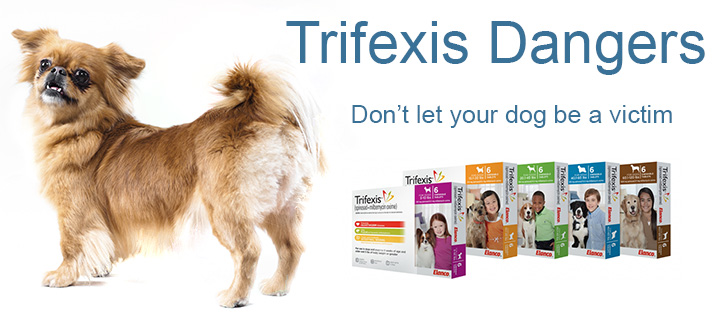The Heartworm Medication Trifexis Is Causing Dog Deaths

There have been many reports this week of the heartworm drug Trifexis® being responsible for the deaths of 700 pets this year. That’s 120 more than have died from eating Chinese chicken jerky. And just like the jerky, veterinarians and the FDA are slow to do anything about it.
What Is Trifexis®?
Trifexis is a multipurpose heartworm, flea and parasite prevention medication that’s been on the market for nearly three years. It contains two active ingredients: spinosad and milbemycin oxime. In Trifexis® clinical trials, the most common adverse reactions (in order) were vomiting, depression/lethargy, pruritus, anorexia, diarrhea, trembling/shaking, ataxia, seizures, hypersalivation, skin reddening. But pet owners are reporting these reactions with alarming frequency and, so far, 700 deaths have been reported.
Spinosad is a broad insect pest spectrum used as a pesticide on crops since 1997. Insects treated with spinosad show involuntary muscle contractions and tremors resulting from activation of motor neurons, with prolong hyperexcitation resulting in prostration, paralysis and death in fleas – often within minutes of taking the drug.
Spinosad is also the active ingredient in Comfortis® and also Natroba for human head lice. It kills through both contact and ingestion but is much more effective if insects ingest it. Spinosad is not listed on US EPA list or CA Prop 65 list, which suggests it’s not been found to be carcinogenic.
It appears to be well known that spinosad can interact badly with ivermectin (Heartgard®). A study found ivermectin toxicity in dogs when given in conjunction with spinosad (Comfortis®). The findings suggest that spinosad increases the risk of ivermectin neurotoxicity by inhibiting the secretion of ivermectin to increase systemic drug levels and by inhibiting P-gp at the blood-brain barrier. (http://www.ncbi.nlm.nih.gov/pubmed/21321059)
Trifexis® and Comfortis® both carry warnings abut this on their websites. Vomiting, loose stools, bloody diarrhea were the most common adverse reactions during Comfortis® trials. There are also some reports of seizure like symptoms, lethargy, weight loss and respiratory issues.
There are lots of anecdotal reports of dogs suffering severe vomiting, stomach issues, lethargy, lack of appetite, kidney failure, seizure-like symptoms, vestibular symptoms and death after being dosed with Comfortis®. Many of these stories can be found in the comments under this veterinary article advocating Comfortis as a wonder drug.
The second active ingredient in Trifexis®, milbemycin oxime (trade name Interceptor), is also used in Milbemax (with praziquantel), and Sentinel Flavor Tabs (with lufenuron). It acts by binding to glutamate gated chloride ion channels in invertebrate nerve and muscle cells, causing paralysis and death of the parasites. It may also act by disrupting the transmission of invertebrate neurotransmitters.
Adverse effects reported for milbemycin show (in order of frequency) 9,359 instances of it being ineffective against heartworm, vomiting (2453), diarrhea, ineffective against ascarids, depression/lethargy, ineffective against hookworms, whipworms, anorexia and many more.
Adverse Effects
Reporter Jim Strickland from Atlanta has obtained the detailed clinical reports on the adverse events from Trifexis®. In its short life, the drug has resulted in the following reports:
 Emesis: 23,360 number of times reported
Emesis: 23,360 number of times reportedLethargy: 7,366
Lack of Efficacy: 5,707
Vomiting: 4,570
Ineffective, fleas: 2,870
Diarrhea: 2,468
Behavioral disorders: 1,448
Seiaures: 1,363
Pruritis: 1,044
Anorexia: 1,028
Itching: 1,017
Ataxia: 953
Shaking: 930
Ineffective: hookworms: 916
Ineffective: heart worm larvae: 810
This in addition to the 700 reported deaths. However, the FDA said that while it’s heard the complaints and is monitoring the product, there’s no link between Trifexis® and the death of any dogs. The manufacturer of Trifexis®, Elanco, also states they are monitoring the deaths although there’s no indication of this on their website.
Keep Calm And Carry On
In the face of the recent surge of complaints, the AVMA issued the following statement:
“Today, we received an update. A summary of the pathology/necropsy reports from an independent pathologist has determined that the cause of deaths were unrelated to the administration of Trifexis®. The summary was derived from the individual pathology/necropsy reports which led attending veterinarians to also conclude that Trifexis® was not the cause of death.”
Who was the independent pathologist? Jeffery A Engelhardt, who was employed by the manufacturer of Trifexis®, Eli0Lilly/Elanco, from 1985-2004. It appears that he might not be as independent as the AVMA indicates.
So the veterinary association isn’t yet willing to act on the reports and they’re relying on information that is likely produced by the drug manufacturer. This shouldn’t come as a surprise however – when dogs and cats were getting ill and dying from tainted pet food, the veterinary associations supported the pet food manufacturers and encouraged pet owners to keep feeding kibble – a position that cost many more pets their lives.
Despite the AVMA’s position, the complaints of Trifexis® related deaths and adverse events continue. The Facebook page, TrifexisKillsDogs, contains many stories and updates on the product and accusations.
Beth Timms said her dog, Gizmo, was lethargic, suffered vertigo, seizures and a 106 degree fever after her vet prescribed the dog’s first ever dose of Trifexis®.
“We had to let her go. We had to have her put her to sleep. I killed my dog,” she said.
Much of the media attention began with seven Vizsla puppies that were born in June 2013.
While four of these puppies are thriving and have never had Trifexis®, three puppies each got their one and only dose of Trifexis® in early to mid September. One died within six days while two were dead within three weeks. Each puppy died of heart inflammation.
The cause of death is still being researched, but the only common element is the Trifexis®.
Trifexis is also marketed under the private label Vethical ComboGuard for VCA vet clinics. Vethical also has a Comfortis® equivalent called Acuguard.









No comments:
Post a Comment